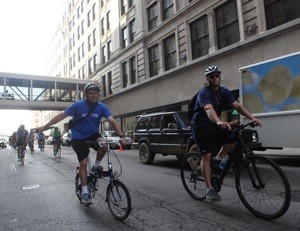Annual events like Bike to Work Day are great for drawing attention to sustainable transportation options. But what can cities do to get people to consider car-free commuting the rest of the year?
Maggie Awad is with Arlington Transportation Partners, a “business-to-business transportation consulting organization” based in Arlington County, Virginia. Writing for Mobility Lab, Awad says her org's “Champions” program has had success working with government and private entities to make car-free and car-lite commuting a habit, rather than a special occasion.
In 2013, ATP recognized 31 Champions, and since the inaugural year, the program has grown to recognize 241 businesses, multi-family residential communities, public schools and commercial properties. In terms of reach to potential Arlington at-place employees, that’s a 12.2 percent population reach. So how did the program build critical mass, and why is this an answer for cities struggling with fleeting interest after an event has expired?
ATP and Champions took what was already working in Arlington County and amplified it with a strategic plan to give employers bite-sized achievable actions that would turn into large accomplishments over a nine-month period. That’s 270 days instead of just one, but single day events like Bike to Work Day and National Walking Day are always great ways to open doors and start the conversation to get employers involved who otherwise aren’t typically interested in transportation. The trick was to then turn that single-day engagement into a year-long commitment.
With time, similar programs to Champions could help employers increase a transit subsidy for employees, spend less on parking subsidies, form vanpools for commuters outside of the core business district, achieve national recognition for bicycle infrastructure, and more. Of course, the greatest achievement will be for the county, city or jurisdiction through company/employee retention as business communities grow, resulting in improved economic development.
Elsewhere on the Network today: Washington Area Bicyclist Association says a few minor upgrades made a big difference for a DC bike-ped trail; Bicycle Law explains the importance of vulnerable road user laws, and how idiot politicians are keeping Louisiana cyclists at risk; and ATL Urbanist calls attention to a plan that would privatize part of the downtown Atlanta street grid.




